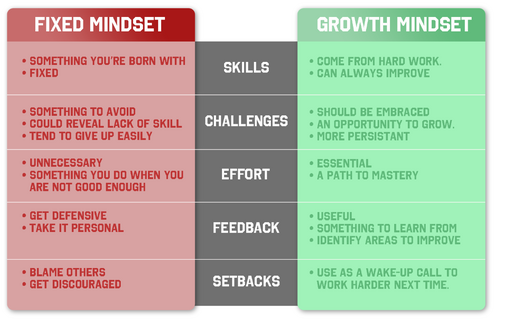Growth Mindset
The term mindset was developed by psychologist Carol Dweck. Carol Dweck is a professor of psychology at Stanford University. She has been researching motivation, personality and development and noticed that children can react in different ways to challenging exercises. After much research, she came to the conclusion that, depending on one's beliefs, one is more likely to act according to a fixed or a growth mindset.
Fixed vs Growth mindset
People with a growth mindset are convinced that they can always become more intelligent and better at something and that they must make an effort to achieve this. According to them, failure is a learning process and they can learn from it to do things better in the future. They see those who do better than them as a source of inspiration. By observing their strategies and working methods, they can learn from these people and grow a bit themselves.
People with a fixed mindset, on the other hand, view intelligence and learning differently. They are convinced that their intelligence and any other talents are innate and quite unchangeable. According to them, making an effort is mainly a proof that they are not intelligent enough or that they do not have another talent. Failure is seen by them as a sign that they have little aptitude for a certain skill or that they are stupid.
When someone performs better than them, they find it annoying because they are convinced that this person has a higher IQ or is simply more talented at something. Since these things are unchangeable anyway, there is nothing to learn from them.
Mindset depends on context

Depending on which conviction someone has in a certain context, one can rather work according to a fixed mindset or a growth mindset.
So it could be that someone is using a growth mindset during a music lesson, but at sports he or she is completely blocked by a fixed mindset.
When a person has a growth mindset, they stop and think about their mistakes and try to use them as a basis for improvement, resulting in better and more profound learning. However, if your beliefs are more closely tied to a fixed mindset, you will learn less from your mistakes and you will learn less in depth. You will not develop your full potential because you make less use of learning opportunities.
Tips to stimulate a growth mindset
- See your challenges as opportunities. Focus on the learning process
- Reflect each day on what you've failed at (and learned from). Focus on learning from mistakes
- Stop seeking approval from others. Focus on the effort you made
- Identify opportunities to celebrate the success of others
- Focus on rewarding actions, not traits. Focus on learning
- Start using the word "yet" more often (I’m not there yet): focus on the growth you’re making
Ted Talk by Carol Dweck
Carol Dweck researches “growth mindset” — the idea that we can grow our brain's capacity to learn and to solve problems. In this talk, she describes two ways to think about a problem that’s slightly too hard for you to solve. Are you not smart enough to solve it … or have you just not solved it yet? (10’11”)